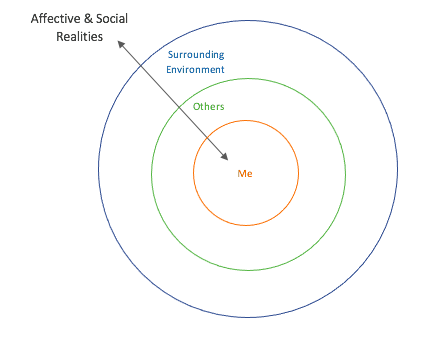Paradox, Prediction & Perception: Why Context Matters in the Practice and Embodiment of Mindful Awareness

By Michelle L. Maldonado, Guest Contributor
What happens to one of us, happens to all of us. These words repeat themselves like a song’s refrain playing over and over again in my mind just as strongly today as when my family and I first began to speak this phrase some time ago.
For many in our families, communities, and places of work, the vision and wish for equality and equity, coupled with wise and compassionate action to transform societal conditions, have been a life-long endeavor. For others, we are only recently awakening to the ways in which our social and familial circles have co-created microcosms across our spheres of influence that reflect the larger social and economic systems, policies, applications, and practices we seek to transform today. Through a combination of quiet, unintentional, and unconscious behavior, as well as thoughts and actions, these microcosms continue to exist.
The very fact that each and every one of us, including within our contemplative communities, is not immune to the things that plague humanity is a beautiful example of our interdependent and interconnected humanness as well as the power we have to create shift and transformation when our considerable resources are brought together. As you read this article, some of you may notice sensations in the body arising. Perhaps you also may be thinking, “I already am doing this work. I’m already cultivating my way of being.” To you I smile and say, thank you with deep and profound gratitude and acknowledgment. And, I also say, there is always more.
Paradox
During these protracted times of our global pandemic, social and racial unrest, and highly charged political climate, we are confronted with daily experiences of paradox. According to the Merriam-Webster Dictionary, one meaning of paradox is a “statement that is seemingly contradictory or opposed to common sense…” I invite you to pause here for a moment, perhaps even closing your eyes and taking a slow, gentle breath in and out to reflect on this notion of paradox. In what ways might it be showing up for you right now? Consider what you notice from print and online media and conversations with others. Consider how paradox may be showing up for others around you, your families, communities, country, and the world. When we think about this cascading awareness of paradox, things can get pretty complicated, pretty fast.
You see, paradox is one of the perpetual launching points that keeps our brains busy processing, translating, and interpreting data around us as it engages in deliberate sense-making while we more consciously try to make sense of the world and all that is happening in it.
It is in these spaces and places that we are called to remember that context matters. The way we process and interpret paradox is related to our life experiences – our crucibles, our celebratory moments, and everything in between.
Prediction
To talk about paradox, we also need to consider that our brain’s processing of paradox is related to its natural design to predict our way through our life experiences. In Dr. Regina Pally’s, The Predicting Brain, we learned something very important about the nature and function of our brain:
“ …. [I]t non-consciously predicts what is most likely to happen and sets in motion perceptions, emotions, behaviors and interpersonal responses best adapted to what is expected— before events occur…. The brain uses past learning as the guide for what to expect in the future. Because of prediction, present experience and responses are shaped by the past.”
While our brain’s predicting nature helps us to categorize and be prepared as we walk through and experience others and the world, it only can predict based on concepts from past experiences, leaving us vulnerable to interpretation error. In fact, Pally notes that “Predictions based on the past allow for more efficient brain function in the present but can lead to mistakes” because our available data set is limited. As a result, the brain must fill in and give its best, educated guess of what an outcome may be. Net-net, our brain predicts a few minutes into our future every few moments and then, for the most part, we live out the future we expect. We experience what Lisa Feldman Barrett calls in her book, How Emotions Are Made: The Secret Life of the Brain, a combination of affective and social realities. It is within the intersection of these realities that our experiences encode our brain’s neurocircuitry, influencing prediction and perception in the context of the human experience. Ah, there’s that word again – context.
Perception
As I mentioned earlier, context matters. I might even go out on a limb and suggest that context is everything when it comes to the lens through which we see and experience ourselves, others, and the world. Our perception is one of the filters that influence this lens. In the way that we might use a softened cloth to clean the lens of our glasses or camera to see more clearly we, too, must do this to clean the emotional, somatic, and cognitive lenses – our filters – so that we can see and feel more clearly on the road to wise and compassionate action toward ourselves and others.
Mindfulness helps us deepen this awareness. Imagine three concentric circles. Then imagine touching into the feeling of being the innermost circle. This tender center place is where the awareness of our mind and body sits and is cultivated. We then bring this awareness of self to the next outer circle – others – where we not only notice how we are received and perceived by others, but also how we receive and perceive them. And, finally, bringing this through-line of awareness into our surrounding environment. These two outermost circles are the playground where we all meet in the world and where our perceptions are shaped and reshaped, feeding our brain new data, along the way.
Similar to a predicting brain pulling from past experiences, so too do our perceptions. We know from scientific research that predictions from early life can be “deeply encoded and enduring” (Pally 2007) creating perceptions that may not accurately reflect the fuller truth of what is present. To do our work of discovery and healing with self-compassion and courage helps us reconstitute ourselves and the lens through which we view ourselves and the world. It helps us show up more fully human. Our states of being – emotionally, physically, spiritually, and mentally – matter. The unhealed or healing states of the trauma we hold in our minds and bodies matter because it is in this mixing bowl of paradoxes that the ingredients of prediction and perception are blended and carried with us everywhere we go creating ripples of impact across our spheres of influence.
For these reasons, and more, our broadened awareness within shifting contexts, along with an embodied practice of mindfulness, help us surface that which needs to be brought to light and that which needs to be let go of. An open heart helps cultivate an open mind. A curious, beginner’s mind helps open pathways of connection and understanding. Altogether, we deepen our felt sense and know that what happens to one of us, happens to all of us on the way to recognizing and embracing our common humanity.


0 comments
Leave a comment
Please log in or register to post a comment